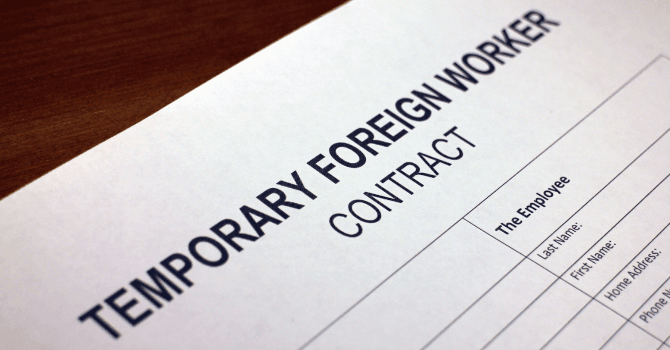Hiring Foreign Workers On Behalf of Your Renovation or Construction Company
By Editorial Team
Updated on December 2, 2023

Have you ever thought about hiring labourers from foreign countries to offset the labour shortage, acquire new talent, or diversify your team? If so, it could be a great entrepreneurial strategy.
However, as you’ve probably guessed, it can’t be done in a flash, and there are necessary steps to follow and very strict standards to abide by. Here’s an overview of what working with foreign workers entails.
How can you hire temporary foreign workers in Quebec?

Source: Canva
First and foremost, you have to consider qualified local candidates before you even attempt to fill positions with international labourers. Have you set your sights on workers outside of Quebec? Perfect.
According to Sonia Lopez Moran from Stretegiko, with whom we sat down for an interview, all companies must assess their ability to adapt accordingly and determine if they have the necessary resources to carry out projects without a hitch, before pursuing the possibility of hiring abroad. If your answer to both these questions is “Yes,” start looking to unearth those lucky few.
To do so, you can, amongst other things, create an employer account on the Québec emploi website under the international section. From said service, you’ll be able to see candidates according to common research criteria such as region, contract duration, level of education, industry, etc.
Has your research paid off? You’ll need joint approval from the Government of Quebec and the Government of Canada to hire a worker. You’ll be asked to submit a Labour Market Impact Assessment (LMIA) with both governments simultaneously.
As for the selected individual, they’ll have to submit a temporary selection application to the provincial government to obtain a Québec Acceptance Certificate (CAQ). It’s your responsibility to send their request at the same time you submit your LMIA application.
If the LMIA is positive and your temporary selection request is accepted, you’ll receive a letter co-signed by both governments as well as two CAQ copies. You’ll then be asked to send these documents to the candidate to move forward with the last step.
Lastly, the foreign worker will have to contact the Government of Canada to obtain their work permit by submitting two CAQ copies and your letter confirming the temporary work request. To qualify, the applicant may be asked to submit additional documentation (work experience, criminal record, birth certificate, health check-up, diplomas, references, etc.).
This final step will have to be approved and confirmed before the plane ticket is purchased. The work permit will be handed to the worker upon arrival.
Foreign Worker Hiring Conditions
Source: Canva
Highly qualified or specialized workers
To be eligible to hire some highly skilled labourers, your company must be endorsed by partners to the Canadian government. Their role is to determine whether the vacant position truly calls for foreign talent, whether it's vital to your company's development, and whether your company has innovative qualities.
The authorized partners are Quebec Technology Association (AQT), Québec International and Investissement Québec.
To learn more about requirements and exemptions, read the hiring requirements in Category A: Global Talent Stream, or see the list of occupations requiring global talent in Category B.
Workers already in Quebec
Are you looking to extend or renew a work contract? Are you looking to hire a foreign worker who’s already in Quebec, for example, an individual whose contract with another employer is nearing its end? The steps are the same: Submit an LMIA application, a new CAQ and a second work permit.
Workers eligible to the Facilitated LMIA
The Facilitated Labour Market Impact Assessment allows employers to fast-track their temporary foreign recruitment process for workers who will fill select positions as listed below.
Here are examples within the construction industry:
Engineering Director
Architecture and Science Director
Construction Director
Construction and Residential Renovation Manager
Property Management Agent
Insurance Adjusters and Claims Examiner
Civil Engineer
Mechanical Engineer
Electrical and Electronics Engineer
Metallurgical and Materials Engineer
Geological Engineer
Architect or Landscape Architect
Urban and Land Use Planner
Land Surveyor
Civil Engineering Technologist and Technician
Construction Estimator
etc.
How to Prepare and Submit an LMIA Application

Source: Canva
This evaluation is used to determine whether the foreign worker is fulfilling a real need and whether no Canadian resident is available to perform the tasks requested by the employer. We advise you the keep track of any and all reasons for which you can’t hire a local worker (résumés received, unsatisfactory interviews, etc.).
You’ll need to request an LMIA application from Employment and Social Development Canada (ESDC) and the Government of Quebec from the Ministry of Immigration, Franchisation and Integration (MIFI). Note that, in Quebec, the documents provided regarding yourself and your company must be submitted in French. Expect a 3- to 6-month delay.
*Note that all supporting documentation that isn't in French will need to be attached to an official translation of the original document or a certified translation of the original copy.
You’ll need to include the following with your request:
A photocopy of the relevant LMIA application. It depends on which program you registered with and whether the workers are hired to fill high- or low-income positions (+ or - $25/h). To determine the appropriate salary, use the National Occupational Classification (NOC) table.
The completed and signed Déclaration de l’employeur - Programme des travailleurs étrangers temporaires (Employer Declaration - Temporary Foreign Worker Program) form. Indicate the months of experience you deem necessary to perform the work needed and attach all supporting documentation.
A signed copy of the work contract that both you and the employee have agreed to.
The worker’s temporary selection application form. Verify that the section “Authorization given to employer” is completed and signed.
Photocopies of any supporting documents related to the worker (passport pages, current résumé, diploma and transcript, work experience related to the job, former work permit if ever there is one, etc.).
Fees of $432 per worker (non-refundable) to review your request.
Who’s exempt from the LMIA?
To know if you can jump over this step, check out the LMIA exemptions via the International Mobility Program.
Here’s a list of reasons you could bypass the need to obtain permission from the Government of Quebec for an LMIA and/or Quebec Acception Certificate:
The job offered lasts less than 30 days
The individual is a company transfer
The worker won’t receive monetary compensation
The employee is a member of the International Experience Canada (IEC) or has a Certificat de sélection du Québec (CSQ)
It’s a free trade agreement
Note that, for jobs provided by the LMIA, you’re still required to obtain a work permit via Immigration, Refugees, and Citizenship Canada (IRCC). If an exemption code applies to your situation, you must indicate it in your job offer.
Foreign Worker Government Programs Specifications

Source: Canva
Here’s how Lopez Moran summarized the programs available for hiring foreign workers:
Temporary Foreign Worker Program (TFW): It allows employers to bring over immigrants for temporary jobs.
International Mobility Program: For temporary foreign workers who don’t need to obtain an LMIA and/or Quebec Acception Certificate.
Regular Skilled Worker Program (RSWP): If the worker wants to immigrate to Quebec permanently for work purposes.
Seasonal Agricultural Worker Program (SAWP): As the name already implies, this one doesn’t concern you…
Your Obligations to Foreign Workers
We’ve also learned during our interview with Sonia Lopez Moran that an employer has more obligations toward a temporary foreign worker for short-term contracts (6 to 9 months) than for contracts lasting 2 to 3 years.
Here’s a list of your obligations to foreign workers:
Fill in, sign, and submit a work contract in good and due form.
Pay costs related to obtaining necessary company authorizations, such as a Labour Market Impact Assessment (LMIA) as part of the Temporary Foreign Worker Program (TFWP).
Verify that the worker has a Quebec Acceptance Certificate (CAQ), or if they’re exempt from it, as well as a work permit.
Help the worker obtain their documents (identification papers, SIN, medical file, etc.).
Offer, free of charge, medical insurance, as long as the worker isn’t covered by the RAMQ.
If it’s a low-income position (paid less than $25/h): Assume transportation costs to and from the work site and affordable housing.
Report to the CNESST among others the hiring of a temporary foreign worker.
Respect the previously mentioned commitments established during the hiring process, such as salary and method of payment, number of work hours, type of tasks, etc.
Fulfill the terms and requirements mandated by the LMIA and Immigration and Refugee Protection Regulations (IRPR).
Advise the governments and submit a new LMIA request if needed should the work conditions change along the way.
Keep all important documentation for 6 years.
Comply with employment-related laws, both provincial and federal.
Naturally, as an employer, you’ll need to respect these laws and fulfill your obligations toward your labourers, whether they’re foreign or not. Otherwise, you could be sanctioned for non-compliance. Well, at least now you're more informed!
Get new contracts for your construction or renovation company
RenoQuotes.com can help you get new contracts. We get new project proposals from clients seeking top-rated and trustworthy renovation professionals like yourself. To get started, simply fill in the form on our homepage (it only takes a few minutes) and receive information regarding potential clients by way of our services.
Dial 1-844 828-1588 to speak with one of our customer service representatives.
Looking for something else?
Related articles
The latest industry news, interviews, technologies, and resources.

Editorial Team
•08 Nov 2023
We are currently going through an unprecedented situation around the world. It's hard to predict how much time the containment measures adopted to control the COVID-19 pandemic will last and we can see how these circumstances may cause anxiety, especially for business owners. As you probably know, the different levels of government (federal, municipal and provincial) are creating financial assistance programs for individuals and companies.

Editorial Team
•16 Jan 2026
Do you think it’s complex to put together a construction company’s marketing strategy? Think again. Marketing in the construction industry follows the same fundamental principles as any other field.

Editorial Team
•08 Nov 2023
Have you met an interior system contractor before? This is a profession where precision is essential to ensure quality finishes inside the home. The installation of the interior system consists of erecting walls, partitions, and suspended ceilings, but also aims at the work of insulation and soundproofing.

Cynthia Pigeon
•08 Nov 2023
Are you looking to revamp your furniture or completely redesign a room? Repainting is often the least expensive way to give your furniture a bit of a spruce.

Editorial Team
•11 Oct 2024
Lacking in the idea department when it comes to choosing tiles for your tiny bathroom? If you manage to do it right, it could look a lot more spacious than it actually is. How can you go about choosing the perfect, size-appropriate tile for a bathroom? What colours and patterns can make a room appear bigger? Every decision must be guided by the room’s square footage to maximize comfort and aesthetics.